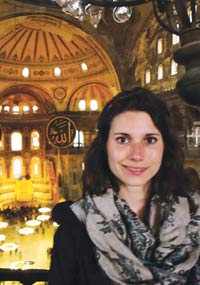College Stories 2011: Kamla
 Kamla
Kamla
by Sarah Bufkin
People often ask me about India. “How was it?” they prod. “Did you just love the food?”
For someone who loves to talk as much as I do, my response never fails to be brief. Hot. Amazing. Exciting. Hot. If this particular person’s voice is brimming with enthusiasm, as happens more than one would expect at Carolina, I may even take the liberty of a whole sentence. Just the thought of a mango smoothie from Jal-jog Chouraha makes me salivate.
It’s not that I do not want to talk about the nine weeks I spent volunteering in India — far from it. But I learned after my first few encounters stateside that to explain my experience would take more time than either party had and might even be beyond the limits that language imposes upon us. To say that Rajasthan in the middle of the summer is hot is an understatement; but could anyone ever understand what it feels like to walk through the desert in 120-degree heat in pants, to sweat so much you develop a rash, to watch your lone ceiling fan drift to a halt after the power goes out yet again and know that you won’t sleep again until it’s whirring happily overhead, to fall prone to spontaneous nose bleeds brought on by the dry air?
Some experiences cannot be described, but must be borne.
If I were to attempt to say what India did for me — what that summer changed in me indelibly, what marks all the small moments and eddies of that experience left on the bare sand of my life — I might describe my first field visit to a mining community near Kota. I might talk about the interview I conducted with a woman, or I should say girl, named Kamla. I might attempt to explain how my life changed then and there without warning, without a thunderclap, without me even realizing it. Or I might write a poem.
Kamla
The walls flake with cerulean paint
and arch into a ceiling crusted with lavender,
yet the room exhales moisture, not unlike
the damp snorts of cattle. The air wears its heat
heavily, also like a cow, newly-swollen
with child and lumbering. But the weight
of the silence is more urgent — curiosity
propagating in waves from a horde
of brown eyes, all hovering in the door
frame in a cacophony of worn clothing.
The children block out the sunlight,
throwing a shadow across the patched rug
and the plastic cups and the battered iron
pot and the expanse of dirt. The shadow shifts;
sometimes a head in profile stands out, sometimes
the protrusion of an elbow or the swell,
like ripe fruit, of a toddler’s stomach.
Before brown skin and a shadow the brown
of cardamom cast on a brown floor, the red
of her saree gleams like the seeds
at the heart of a pomegranate.
Her name is Kamla, she’s fourteen —
or was it fifteen? She could not remember
— and I think she is the most beautiful girl
that I have ever seen. But no, it was more
that she drew eyes like the smell of chai
steaming on the roadside at dawn, seduced
like the cold exhale escaping
the door of the movie theatre as it swings shut.
Or she was no more beautiful than any girl
but her eyes almost echoed, like wells stretching
deep and hollow beneath the desert crust.
In the interview, Kamla sipped Fanta
from the crinkled cup before starting
to tell us, in that room lost to a dream
of lavender but resonating with brown,
beneath a ceiling drooping with heat,
surrounded by children who could not be
children but already worked in the mines,
told us — she smelts iron every day,
in a saree like a pomegranate and bare feet,
for less money than a cup of coffee.
She married a boy she had never met
when she turned thirteen. She started work
at ten. She lives with her boy-husband
beneath a tarp that wears the face
of the latest politician to promise change
in this place. She cannot read. Her eight
-month-old son will never go to school.
Her favorite colors are pink and green,
like the ripe meat of a watermelon.
As I move past the jumble of brown
elbows and sandals and patched cloth,
through the mass of pots and plastic bottles
littering the courtyard, into the backseat
of the car that shepherded me to this settlement,
the children pose for photos and run
in circles with the chickens. I wave goodbye
through the window. In the pane, I watch
the blossoms of sarees swaying, catch
the burst of my reflection, and through it, Kamla
with her son hoisted on her hip. I avoid
her eyes, round and turbulent and brown.
Sitting across from Kamla on that patchwork rug with my plastic cup of Fanta, the surrealism of the moment struck me like a wave of relentless desert heat. For this brief 45-minute interlude, the two separate spheres of our lives had passed through one another’s; these two worlds that could not be farther apart had brushed for an instant in a room with cerulean walls and a lavender ceiling, beside a portable cook stove, within earshot of the sandstone quarries. And, as I smiled and passed Kamla the carabiner hanging off my water bottle for her son to play with, I realized that the only thing that separates those two worlds — that puts me in the place of a well-off, educated, independent student and her in the place of an illiterate, malnourished, underage mother — is chance.
Some experiences cannot be described, but must be borne.
Sarah Bufkin, a rising junior, is a history major with a minor in creative writing. She is originally from Atlanta. After graduation she hopes to continue to write and to attend graduate school.